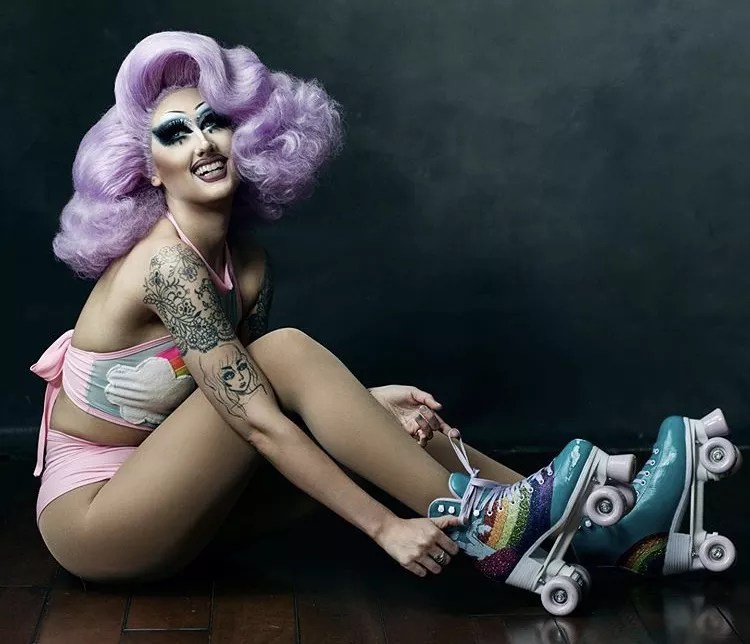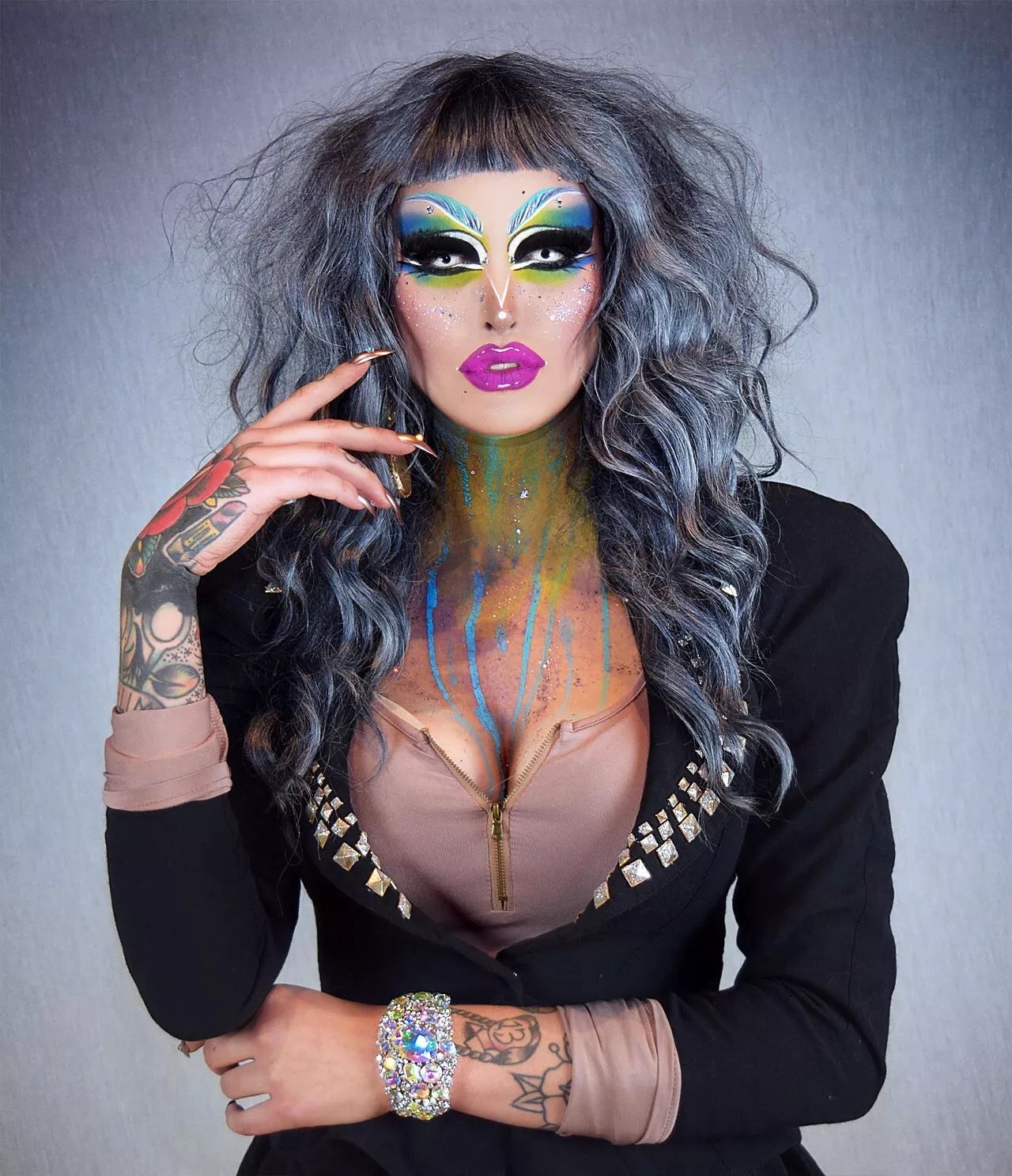
Brandon Lyon

Audio By Carbonatix
The art of drag is no longer exclusive to men. Drag is for everyone, including biological women. The tradition defining a drag queen as a man who dresses up in women’s clothes, typically for the purposes of entertainment, is changing rapidly in Dallas. And this change is perhaps unsurprising. After all, beneath the fierceness and comedy, drag is inclusive by nature.
The performance art isn’t only about gender bending; it’s about embracing and celebrating fluidity, femininity -or in some cases, masculinity – for performance artists known as “drag kings,” the name given to women who dress up as men, which is often what people assume that women drag performers do.
“For the most part, people do assume and it goes straight to ‘You’re not a boy so what does that mean?'” says Porter Bella Graves, winner of last season’s drag competition at LGBTQ bar Sue Ellen’s. Porter Bella Graves is the “drag daughter” of mentor May May Graves, a respected drag and burlesque performer and owner of The Leg Room, previously known as Dallas School of Burlesque in Deep Ellum.
The nomenclature in the drag world is vast, particularly when in reference to female drag queens: bio queen, femme queen, faux queen, cis female queen, hyper queen and the list goes on. While each performer may prefer a different title, there seems to be a consensus that, above all, female queens are drag queens.

Porter Bella is a female drag queen in Dallas.
Jose Placeres
The practice isn’t new. San Francisco holds a yearly faux queen pageant that first started in 1996. But Dallas in particular has embraced a trend of female drag queens who perform on a regular basis.
“I always looked up to drag queens. I thought they were fantastic beings,” says Fauxbia, a Dallas-based faux drag queen and creator of a drag variety show that spotlights female queens called “That Time of the Month.” Fauxbia says she didn’t realize that cisgender women did drag until she stumbled on them on Instagram. Rolla Derby, another local female performer, also recalls first discovering female drag queens on social media.
“Now I can be this female creature that I loved to dress up as when I was a kid,” Fauxbia says with a smile.
Drag has become an outlet of creativity and happiness for local Dallas queens, just as it for male queens. Porter Bella remembers how she felt when she first found drag: “It was so euphoric. I feel like I’ve always been a very creative person but I didn’t know how to use it. It was what I was wanting and needing, and I just didn’t know that it was here. It’s the best thing that’s ever happened to me.”
“I’m really proud to be a faux queen,” Fauxbia says, referencing her own name. She prefers this term to the others. “I say ‘faux queen,’ but some queens get offended by it because it’s under the guise you’re not a real queen,” she says. This preference varies from queen to queen.
Graves prefers “drag queen” while Derby has no preference. “When most people say a certain thing, they don’t mean it with mal intent,” she says. “You kind of have to be lighthearted about it.” With no mainstream exposure to female drag performers, there’s a learning curve in correctness from the general public, for now. “It isn’t something that’s super known about, and there are those few people from time to time that say our drag isn’t valid,” Graves says.
The queens say that they’ve only heard of statements like “female drag queens aren’t real” coming from behind a screen. “The whole thing about people not liking female drag queens, honestly, it’s just all people online,” Derby says.
The drag scene, they say, had to adapt to let girls in on the fun, too.
“You wouldn’t announce a ‘normal’ drag queen by their genitalia before they walk onstage, so you shouldn’t announce a bio queen that way,” says Fauxbia, recalling an emcee that announced her as a woman before her performance. “I think the more bio queens that come into the community and the more we’re talking about it -the more emcees know that it’s disrespectful.”
But the truth is, most people genuinely just don’t know that women perform as drag queens.
“I love getting to explain it to people. I do it all the time,” Fauxbia says with a smile. “It’s really just the expression of gender, in whatever way that makes sense to you.”
Porter Bella has the same outlook to being asked about her art form, “There’s been quite a few times where I was performing, and I’ll have somebody grab me after and say, ‘I don’t know how to ask this, but are you a female?’ Which is kind of a rude question, but I don’t have a problem answering it, because it’s usually somebody that has always wanted to do (drag).”
But when it comes to mainstream acceptance and education, female drag queens are still denied the spotlight, they say.
“On television you don’t see us being represented,” Derby says, pointing out drag-centric shows like mega-successful RuPaul’s Drag Race. The reality show, which brought drag to the mainstream, doesn’t allow trans women or cisgender women to compete. In March of last year, RuPaul told The Guardian: “Drag loses its sense of danger and its sense of irony once it’s not men doing it.” The statement received wild criticism from advocates for transgender rights and praise from, well, other members of overlapping groups.
“There are those few people from time to time that say our drag isn’t valid.” — Porter Bella Graves
Contrarily, the up-and-coming drag show on YouTube and Amazon Prime Video, Dragula, is more inclusive to all kinds of drag performers.
“We’re really excited because there’s a drag king in the next season,” Graves says. “It means we’re moving in the right direction.”
Dallas is a globally recognized drag destination. The Rose Room at Station 4, run by Caven Enterprise, is a world-renowned venue that frequently brings in international performers and spectators. Caven is run by Cassie Nova, who employs queens at many bars in the strip on Cedar Springs Road in the Oak Lawn neighborhood, or “gayborhood,” as they call it.
“She really understands a lot of different types of drag and doesn’t discriminate about what type of drag you do,” Derby says of Nova. “The fact that I’m a female doesn’t matter to her, because I’m a hard worker and I produce a good show and she sees that in people – and that’s what it’s about.”
Nova agrees: “If you are sickening and can entertain the masses, I don’t think anybody cares about what or if you are tucking.”
As the first female drag queen hired by Caven Enterprise, Derby has made strides for female queens in Dallas.
“I would say for all three of us, it’s been very easy here in Dallas to be accepted, there’s never been a moment where I felt ‘othered’ because I’m a woman,” she says.
“The bio queen aspect of Dallas drag is still new, but in this ever-changing scene we try to make it a place where everyone can be heard or seen,” Nova says. While the Dallas drag scene is supportive of many styles of drag, that’s not the case in some communities. Graves recalls trying to book a gig in Oklahoma, where she found that venues don’t feature many female, trans or people of color performers.
“In my head, all drag communities are like what we have here, but then when they told me that I couldn’t perform on their strip, I realized how good we have it here,” Graves says.
Whether a community is accepting or not, the amount of work drag queens put into their performances remains the same – hours of crafting, planning, rehearsing and then actually performing.
“I know a lot of people online will say that female queens have it easy, but it’s really not that easy because we do have to try a lot harder,” Derby says. “We’re putting in an equal amount of work if not more, to prove that what we’re doing is valid,” Graves adds.
“Just because you put on a lot of makeup doesn’t make you a drag queen, regardless of gender,” Nova says. “Some of the girls like Rolla and Porter Bella give most male drag queens a run for their money. Their concepts and execution are fully realized and fabulous.”
“If you’re not doing drag, people don’t think about what goes into it,” Graves says. “So I get a lot of people assuming I’m built very well.” All three queens use “pads,” body-forming pillows used to accentuate or create curves, usually around the hips and chest, just like most male drag queens. Fauxbia says the trick makes her feel “confident.”
The padding, “sickening” makeup and the creativity required to make a successful drag performer, also offer female queens a confidence that’s often taken away from women.
“You get kind of pushed down with it when you’re not in drag. You get beaten down with people explaining shit to you and thinking you don’t understand things … thinking that you’re weaker,” Fauxbia says. “But when you’re in drag, no one thinks that about you.”
Each queen has her own weekly performance, with upcoming competitions and other engagements that keep them busy. But Fauxbia, Porter Bella Graves and Rolla Derby perform together in the electric and eclectic “That Time of the Month” brunch show at Urban Cowboy Saloon in Fort Worth twice a month. The show, which sells out every time, spotlights female drag queens and queerlesque, among other types of performers.
“Anything that’s not the norm – we just want to have a place to spotlight that,” says Graves. Fauxbia started the drag event to give queens like herself a place to thrive. Guests are also encouraged to bring three items to donate in exchange for a free mimosa pitcher. All donations are specific to the current needs of the domestic abuse shelter Safe Haven.
“I’ve had 70-year-old woman perform at one of my shows,” Fauxbia says, smirking when she recalls the woman performing along to “Pour Some Sugar on Me” by Def Leppard. “Now that’s the power of drag.”